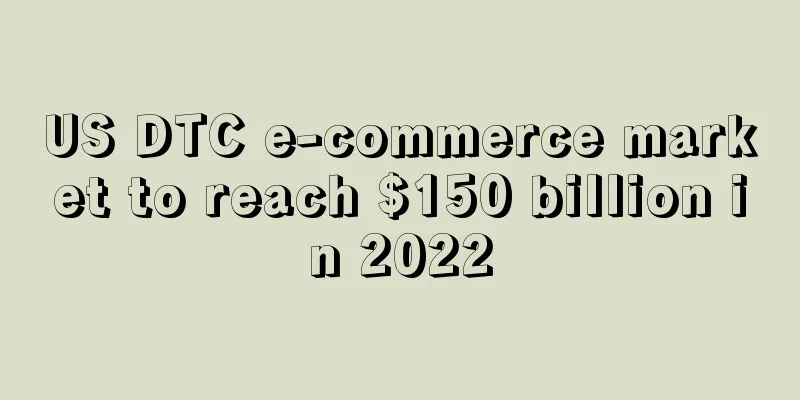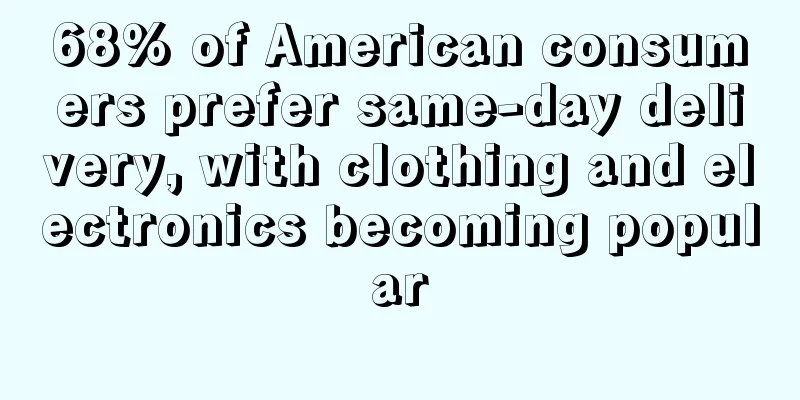US DTC e-commerce market to reach $150 billion in 2022

|
According to eMarketer's forecast, US direct-to-consumer (DTC) e-commerce sales will reach $151.2 billion in 2022, a 16.9% increase compared to this year. In the coming year, although DTC purchases will only account for 2.5% of total retail sales, these brands will successfully subvert the traditional retail industry through diversified consumer experiences .
Pure DTC companies attract consumers through intentional marketing. For DTC companies , customer acquisition costs can also be high , but the DTC model can provide companies with marketing control over each product .
Shane Pittson, Quip’s vice president of growth, told eMarketer that as a DTC company , the oral hygiene supplier can gain better “data and insights” in conversations with retailers to position itself for successful product launches .
It is understood that providing customers with unique, high-quality products is the ultimate goal of every DTC company . As products are provided directly to customers, each DTC faces the challenge of convincing customers that what it offers is something that consumers cannot find elsewhere.
For Ricky Joshi, co-founder and chief strategy officer of mattress company Saatva, that means avoiding the bells and whistles surrounding typical DTC brands and instead “ staying true to the value proposition and the philosophy that the company was started with.”
At the same time, like every e-commerce company, DTC faces the challenge of converting likes into actual purchases . How to improve the ability to convert "add to cart" into " consumer checkout " ? The strategy to drive consumers to open their wallets is different for each DTC .
Kate MacCabe, vice president of product at Brooklinen, told eMarketer that the bedding company has actually benefited from its DTC brand , simplifying the path to purchase in the process. For other DTCs , improving conversion rates may require partnerships with companies like Shopify.
Beyond that, to remain competitive, DTCs must diversify the consumer experience and evolve with customer needs, rather than just selling fixed products on a website. For many DTCs , this means moving beyond the pure DTC model and partnering with external resources in the spirit of growth.
For example, shoe brand Allbirds and eyewear purveyor Warby Parker have physical stores that bring customers offline. Quip partners with existing brick-and-mortar stores, such as Target, to sell its products.
Meanwhile, many DTC companies have expanded beyond their initial hit products . Allbirds now sells apparel , while Harry’s , a company that primarily sells men’s razors , also offers deodorant . This reflects the shift in these brands’ models while still sticking to their value propositions . USA DTC D2C |
<<: Pet Circle, a pet e-commerce platform, received $125 million in financing
>>: Watco children's bathrobes recalled due to flammability risk!
Recommend
This policy is really good! Anker and other big sellers have earned hundreds of millions
The report card of cross-border e-commerce in the...
Haitong Securities Research Report: Digital foreign trade is now in season, and merchants need to focus on the leading platform Alibaba International Station
Recently, B2B digital foreign trade has become po...
An operator with an annual salary of 400,000 quit his job to work alone and was scolded
In the cross-border circle, it is not uncommon fo...
British fashion company Joules' online business grew by more than 50% with sales reaching £187 million
British fashion company Joules said that store sa...
Overseas shopping is booming under the long holiday economy, and the growth rate of import consumption in rural areas exceeds that of first- and second-tier cities
Holiday consumption is an important window for ob...
It is expected to exceed 250 billion euros! European consumers are gradually becoming addicted to live streaming sales
In China, live streaming has become the most popu...
Etsy launches new features, but sellers are not buying it
Etsy recently revealed the latest news about its ...
Amazon failed miserably? The online clothing craze is coming, and the British love to use these websites
The latest research data shows that British consu...
U.S. home goods online sales grew 51.8% in 2020
In 2020, the outbreak of the new coronavirus chan...
The maximum subsidy is 11 million! The country’s first RCEP cross-border e-commerce special policy is here!
On the morning of March 30, Guangzhou officially ...
Sales of 80 billion in 3.5 years! Backed by Xiaomi, the company successfully IPOs
In recent years, while domestic brands have been ...
Social media e-commerce is flooded with fakes, and it is imperative for platforms to crack down on counterfeiting
The UK Intellectual Property Office (UKIPO) recen...
The sales growth rate of the US "online shopping week" exceeded that of the domestic Double Eleven
According to the latest published data, sellers i...
What is Hunan Search Technology? Hunan Search Technology Review, Features
Hunan Search Technology Co., Ltd. was established...
Total transaction volume jumped 1.8 times, Japan's 2021 "Super PayPay Festival" hit a record high
Yahoo Japan announced that on the last day of the...









